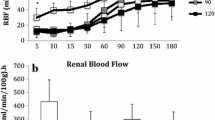Abstract
The detrimental effect of prolonged cold ischemia (CI) on posttransplant renal function has long been recognized. However, the cellular consequences of CI have not been clearly defined. This study describes a model for the identification of CI-induced injury by evaluating ex-vivo renal metabolism and function prior to reperfusion. Small bovine kidneys were cold stored in Viaspan for 24-, 48-, 72-, and 96 h. Kidneys were then warm perfused (32 °C) using Exsangiunous Metabolic Support (EMS) technology and evaluated for oxidative metabolism, vascular dynamics and function. Oxygen consumption, vascular resistance, and diuresis were stable in kidneys with CI up to 48 h. After 72- and 96 h of CI, vascular resistance was increased while oxygen consumption and diuresis were reduced (P < 0.05). Glomerular filtration rate was diminished at CI greater than 24 h (P < 0.05). Results show that function was compromised with CI greater than 24 h and preceded the loss of cell viability following 48 h of CI.
Similar content being viewed by others
Author information
Authors and Affiliations
Additional information
Received: 21 March 2000 Revised: 20 September 2000 Accepted: 8 May 2001
About this article
Cite this article
Stubenitsky, B., Brasile, L., Booster, M. et al. Deletrious effect of prolonged cold ischemia on renal function. Transpl Int 14, 256–260 (2001). https://doi.org/10.1007/s001470100326
Published:
Issue Date:
DOI: https://doi.org/10.1007/s001470100326




